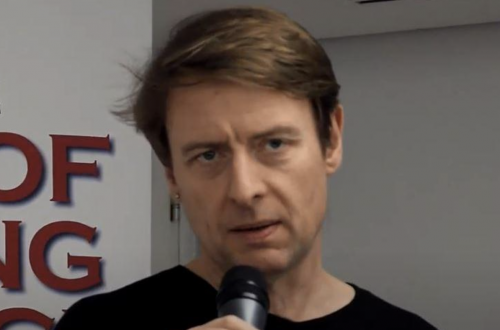Gore Vidal was a man with a talent for the amusing turn of phrase and a strange attraction to silly or obnoxious political views, some of which he may genuinely have held, others of which he may simply have expressed for effect.
He was also extremely posh: a sort of American aristocrat. This, I suspect, was part of his appeal to the sort of people who enjoy a bit of light snobbery along with their radical-sounding politics.
Gore Vidal’s best known book, Myra Breckinridge, was made into a film that was directed by Mike Sarne: who also had a No 1 hit with “Come Outside”, with the late EastEnders’ star, Wendy Richard. The film is not very good. The song, however, is a classic.
Here is Christopher Hitchens on the late Mr Vidal.
I was fortunate enough to know Gore a bit in those days. The price of knowing him was exposure to some of his less adorable traits, which included his pachydermatous memory for the least slight or grudge and a very, very minor tendency to bring up the Jewish question in contexts where it didn’t quite belong. One was made aware, too, that he suspected Franklin Roosevelt of playing a dark hand in bringing on Pearl Harbor and still nurtured an admiration in his breast for the dashing Charles Lindbergh, leader of the American isolationist right in the 1930s. But these tics and eccentricities, which I did criticize in print, seemed more or less under control, and meanwhile he kept on saying things one wished one had said oneself. Of a certain mushy spiritual writer named Idries Shah: “These books are a great deal harder to read than they were to write.” Of a paragraph by Herman Wouk: “This is not at all bad, except as prose.” He once said to me of the late Teddy Kennedy, who was then in his low period of red-faced, engorged, and abandoned boyo-hood, that he exhibited “all the charm of three hundred pounds of condemned veal.” Who but Gore could begin a discussion by saying that the three most dispiriting words in the English language were “Joyce Carol Oates”? In an interview, he told me that his life’s work was “making sentences.” It would have been more acute to say that he made a career out of pronouncing them.
However, if it’s true even to any degree that we were all changed by September 11, 2001, it’s probably truer of Vidal that it made him more the way he already was, and accentuated a crackpot strain that gradually asserted itself as dominant. If you look at his writings from that time, thrown together in a couple of cheap paperbacks entitled Dreaming War and Perpetual War for Perpetual Peace, you will find the more crass notions of Michael Moore or Oliver Stone being expressed in language that falls some distance short of the Wildean ideal. “Meanwhile, Media was assigned its familiar task of inciting public opinion against Osama bin Laden, still not the proven mastermind.” To that “sentence,” abysmal as it is in so many ways, Vidal put his name in November 2002. A small anthology of half-argued and half-written shock pieces either insinuated or asserted that the administration had known in advance of the attacks on New York and Washington and was seeking a pretext to build a long-desired pipeline across Afghanistan. (Not much sign of that, incidentally, not that the luckless Afghans mightn’t welcome it.) For academic authority in this Grassy Knoll enterprise, Vidal relied heavily on the man he thought had produced “the best, most balanced report” on 9/11, a certain Nafeez Mosaddeq Ahmed, of the Institute for Policy Research & Development, whose book The War on Freedom had been brought to us by what Vidal called “a small but reputable homeland publisher.” Mr. Ahmed on inspection proved to be a risible individual wedded to half-baked conspiracy-mongering, his “Institute” a one-room sideshow in the English seaside town of Brighton, and his publisher an outfit called “Media Monitors Network” in association with “Tree of Life,” whose now-deceased Web site used to offer advice on the ever awkward question of self-publishing. And to think that there was once a time when Gore Vidal could summon Lincoln to the pages of a novel or dispute points of strategy with Henry Cabot Lodge …
It became more and more difficult to speak to Vidal after this (and less fun too), but then I noticed something about his last volume of memoirs, Point to Point Navigation, which brought his life story up to 2006. Though it contained a good ration of abuse directed at Bush and Cheney, it didn’t make even a gesture to the wild-eyed and croaking stuff that Mr. Ahmed had been purveying. This meant one of two things: either Vidal didn’t believe it any longer or he wasn’t prepared to put such sorry, silly, sinister stuff in a volume published by Doubleday, read by his literary and intellectual peers, and dedicated to the late Barbara Epstein. The second interpretation, while slightly contemptible, would be better than nothing and certainly a good deal better than the first.
But I have now just finished reading a long interview conducted by Johann Hari of the LondonIndependent (Hari being a fairly consecrated admirer of his) in which Vidal decides to go slumming again and to indulge the lowest in himself and in his followers. He openly says that the Bush administration was “probably” in on the 9/11 attacks, a criminal complicity that would “certainly fit them to a T”; that Timothy McVeigh was “a noble boy,” no more murderous than Generals Patton and Eisenhower; and that “Roosevelt saw to it that we got that war” by inciting the Japanese to attack Pearl Harbor. Coming a bit more up-to-date, Vidal says that the whole American experiment can now be described as “a failure”; the country will soon take its place “somewhere between Brazil and Argentina, where it belongs”; President Obama will be buried in the wreckage—broken by “the madhouse”—after the United States has been humiliated in Afghanistan and the Chinese emerge supreme. We shall then be “the Yellow Man’s burden,” and Beijing will “have us running the coolie cars, or whatever it is they have in the way of transport.” Asian subjects never seem to bring out the finest in Vidal: he used to say it was Japan that was dominating the world economy, and that in the face of that other peril “there is now only one way out.
UPDATE
For those of you who are unfamiliar with Gore Vidal’s acid style and distasteful politics, here’s a snippet from an Observer article in 1999:
First, and most obvious, Madeleine Albright is considered the worst secretary of state since Edward Stettinius. The typing pool’s loss has not been diplomacy’s gain. Like a fool, she went to Rambouillet and presented the Serbs with an Hitlerian ultimatum no sovereign country could have accepted as it involved a near-total occupation of Serbia, free TV time and so on. She was left with an omelette on her pretty face.
The piece is an attack on Clinton’s policy in relation to to Milosevic’s Serbia. Vidal’s basic argument is that the US should not get involved in “someone else’s civil war”. Instead, Vidal argues, the USA should be forced out of NATO and the United Nations, and should face “charges brought against it at the International Court of the Hague”.
This is a good example of the “silly or obnoxious” views Vidal affected to hold.
The humour in this piece is that Albright is belittled as a woman who should really be in the “typing pool” with the other girls, but having risen above her station, has ended up with “omelette on her pretty face”. She is also, apparently, like Hitler.
Normally, liberal and nice people wouldn’t make jokes about uppity women and their pretty faces, and you wouldn’t find such humour in a paper like The Observer. However, because Gore Vidal was able to pose as both a patrician and a radical simultaneously, he was able to provide Observer readers with the opportunity to engage in the sort of smirking that is usually considered out of bounds.


